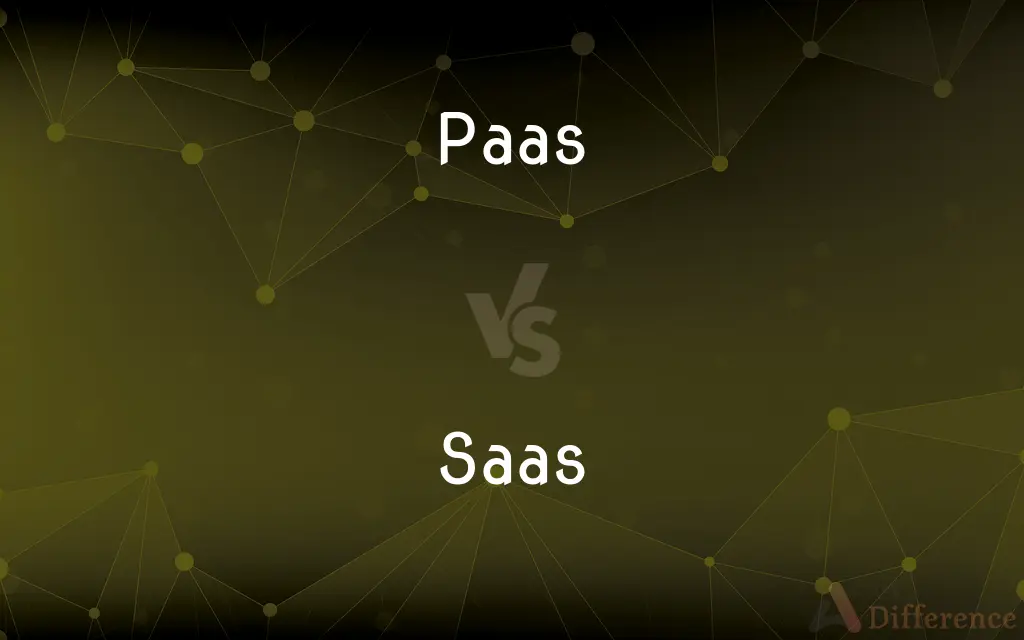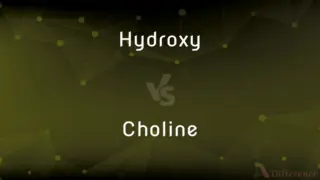Paas vs. Saas — What's the Difference?
By Tayyaba Rehman — Published on September 23, 2023
Paas (Platform as a Service) provides a platform for app development, while Saas (Software as a Service) delivers software over the internet on a subscription basis.

Difference Between Paas and Saas
Table of Contents
ADVERTISEMENT
Key Differences
Paas and Saas are two cloud computing service models that cater to different needs. Paas offers an environment for developers to build, deploy, and manage applications without dealing with infrastructure. In contrast, Saas provides users with access to software applications directly over the web.
When using Paas, developers are provided with tools, libraries, and services needed to create and test applications. It abstracts the complexity of underlying hardware and software layers. Conversely, Saas is more about end-users and offers ready-to-use software applications without needing installations or maintenance.
Paas allows for more customization, as it's about creating unique applications for specific needs. Developers can tweak and adjust as per requirements. On the other hand, Saas applications are generally standardized, and users adapt to the software's features and functionalities.
Paas is typically utilized by businesses aiming to design their software without the hassle of maintaining infrastructure. With Saas, the focus is more on accessing an application's functionality without concerning oneself with its creation, maintenance, or underlying infrastructure.
Cost models also differ: Paas might charge based on resources used during development, while Saas often uses a subscription-based model, where users pay for access to the software, usually on a monthly or yearly basis.
ADVERTISEMENT
Comparison Chart
Primary Usage
App development
Software delivery
User Type
Developers
End-users
Customization
High (based on development needs)
Low (standardized software features)
Maintenance Responsibility
Service provider manages infrastructure; developers manage apps
Service provider manages everything
Cost Model
Resource-based or development-time
Subscription-based
Compare with Definitions
Paas
An environment for building, testing, and deploying software.
Paas solutions streamline the application lifecycle for businesses.
Saas
Cloud-based software accessed via the internet.
Many businesses use Saas applications for CRM and HR management.
Paas
A cloud service offering tools for app development.
With Paas, developers can focus on coding without infrastructure concerns.
Saas
Ready-to-use software without installation hassles.
Opting for a Saas solution, they avoided complex software installations.
Paas
A framework abstracting infrastructure challenges for developers.
Using Paas, the team bypassed hardware setup for their new app.
Saas
A subscription model delivering software applications.
Through Saas, the team could access their tools from anywhere.
Paas
A platform that manages underlying hardware for app creation.
Opting for Paas, the startup accelerated their software development.
Saas
A service offering software functionalities over the web.
Saas platforms like Dropbox have revolutionized file storage and sharing.
Paas
A service model allowing custom software development on the cloud.
Paas became the company's go-to for all application development tasks.
Saas
Software maintained by providers and accessed by users online.
The company shifted to Saas to reduce their IT maintenance overhead.
Paas
Pace
Saas
(India) A mother-in-law, especially the mother of the groom, who lives with the married couple.
Paas
The Easter festival.
Common Curiosities
What does Paas provide for developers?
Paas offers an environment and tools for app development and deployment.
Can applications developed on Paas be unique?
Yes, Paas allows for tailored app development based on specific needs.
How does Saas deliver software to users?
Saas provides software access over the internet, usually via a browser.
Are Saas applications customizable?
Saas applications are generally standardized with limited customization.
What are some common examples of Paas?
Google App Engine and Microsoft Azure are popular Paas solutions.
Is Paas about software creation or usage?
Paas is primarily about software creation and development.
How do costs differ between Paas and Saas?
Paas usually charges based on resources or development time, while Saas adopts a subscription model.
Who typically uses Saas applications?
End-users or businesses accessing software functionalities.
How do Saas applications reduce IT complexity?
Saas eliminates the need for installation, updates, and local maintenance.
Which industries commonly use Saas applications?
Industries from finance to healthcare use Saas for various functionalities.
Is internet access essential for Saas?
Yes, Saas applications require internet access for functionality.
Who handles maintenance in the Paas model?
The service provider manages infrastructure, while developers handle the app.
Does Paas eliminate the need for local infrastructure?
Yes, Paas abstracts infrastructure concerns, allowing developers to focus on coding.
Are updates automatically handled in Saas?
Yes, Saas providers manage updates, ensuring users always access the latest version.
Can Paas and Saas be integrated?
Yes, apps developed on Paas can often be delivered as Saas to end-users.
Share Your Discovery

Previous Comparison
Hydroxy vs. Choline
Next Comparison
Air Purifier vs. HumidifierAuthor Spotlight
Written by
Tayyaba RehmanTayyaba Rehman is a distinguished writer, currently serving as a primary contributor to askdifference.com. As a researcher in semantics and etymology, Tayyaba's passion for the complexity of languages and their distinctions has found a perfect home on the platform. Tayyaba delves into the intricacies of language, distinguishing between commonly confused words and phrases, thereby providing clarity for readers worldwide.













































